Steve Hansen famously threw down the gauntlet in front of Ireland at the tail end of 2018.
He'd just seen his All Blacks side beaten for the very first time on Irish soil by Joe Schmidt’s green machine.
Billed as a bout for title of world’s best, the then number-one ranked side fell to a 16-9 defeat.
That result, 11 months out from a World Cup, set up Ireland, the Grand Slam champions, for a stellar 2019.
"It's their turn [as the world's best], so we'll see how they cope with that," he said.
The answer was not very well at all.
Completely outplayed by England in February, they went missing against Wales in the rain of Cardiff, got well beaten by Japan and then hammered by New Zealand when it mattered.
"Performance anxiety" was the buzz phrase for why Ireland weren’t big in Japan.
You could go way back to Lens in 1999 or you might recall Wellington in 2011 for times when expectations weren’t met by an Irish team with the favourites tag.
Something similar happened last season when Ireland won the Grand Slam.
The result, and the achievement, paved over the performance against England.
All week something just didn’t sit right.
The Red Rose were coming to Dublin as a small speedbump in Ireland’s procession to just a fourth ever clean sweep.
Andy Farrell’s side, having taken care of business against Wales, France, Italy and Scotland, were at the Aviva Stadium to pick up the Six Nations trophy and the Grand Slam.
An English side, who eight months later would come within a penalty kick of reaching the World Cup final, were just a small detail, a box to be checked.
Ireland were favourites to win by two scores and underdog status was gone. The natural order of things had been upset and it just didn’t feel right.
When England came to Dublin looking for Grand Slams in the past, 2001, 2003, 2011 and 2017, Ireland were the underdogs and it suited everyone.
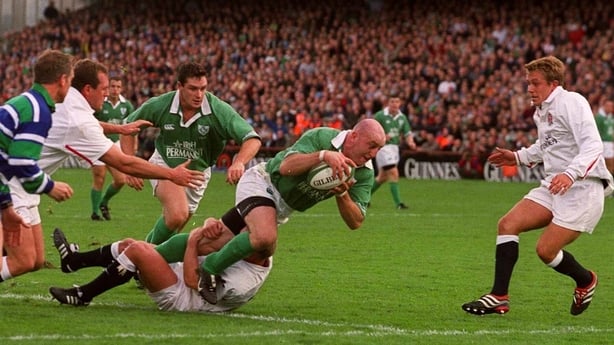
And with the notable exception of the 2003 hammering, from an England team that would go on to win the World Cup, Ireland were able soften the cough of the visiting hordes and suck the gusto out of Swing Low.
Twenty-three years on from the first Slam-buster, the atmosphere, the tension, the craic, and the joy of those days are still fondly recalled. Glory days without the glory.
There was a strange atmosphere in the week building up to the game last season and on the day itself. A collective nervousness had set in, among the media, among the supporters, and perhaps even the team.
Everyone just wanted it done.
The side had demolished Wales with a quick-fire start in the opening game; beaten defending champions France in one of their best ever performances, got out of sticky situations against Italy and Scotland, so a struggling English side, under new head coach Steve Borthwick, wasn't supposed to be so problematic.
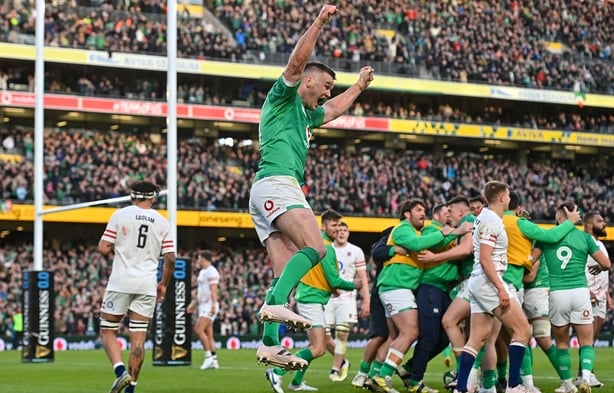
"I thought we weren’t calm enough or clinical enough to play our game," said Farrell about Ireland’s 29-16 win.
"I thought we were a little bit jittery from time to time. We settled down eventually and got over the line."
Was it a reluctance to embrace the favourites tag?
The Ireland that emerged with Brian O’Driscoll and Paul O’Connell to the fore brought the team onto the next level, seemingly at ease with being peers of New Zealand, South Africa, Australia and England. That progress was franked with a first Grand Slam in 61 years.
After that era, regular victories over world champion All Blacks and Springboks teams seemed to cement a new-found confidence and belief.
But how do you negate the collective psychological effect of 150 years of being the underdog, of reveling in the one-off shock, and more importantly, does it effect the players in any way, shape or form?
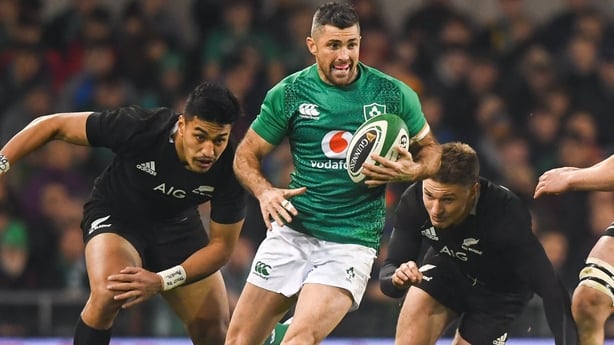
"Not really, sometimes it’s nice to have that element of underdog because expectation isn’t as high and the pressures that come with that," said Rob Kearney before the 31-7 win over Wales, described by Farrell as, at times, passive and lacking intent.
The former Ireland full-back won 95 international caps between 2007 and 2019.
"As a rugby nation we’ve come so far in the last few years that we enjoy being favourites and we should enjoy being favourites," he added on Newstalk.
"It’s something that’s inherent in our DNA as Irish people, that we like being underdogs, that we like not being touted as favourites but I think this rugby team at the moment has given us all life lessons, not just in sport but for greater walks of life, too."
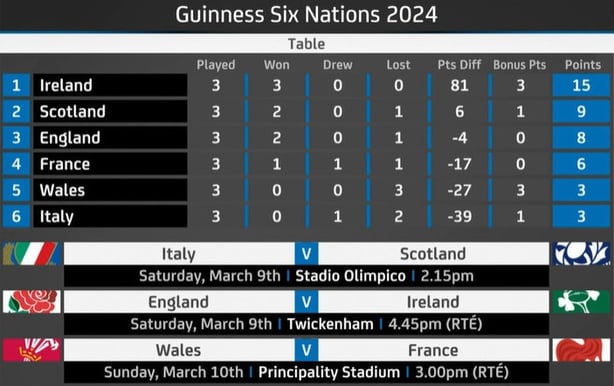
Speaking on this week’s RTÉ Rugby podcast, former Munster out-half Jonny Holland credited Farrell for his work in making the team believe they are as good as the results and rankings suggest.
"They are absolutely embracing it," he said.
"That’s Andy Farrell’s whole thing with [performance coach] Gary Keegan in the background maybe, that they are very comfortable with what they are doing.
"We saw it going into the World Cup, that they were allowed to talk about the World Cup for two years.
"I think that’s Andy Farrell’s best trait at the moment, taking the 'Irishness’ out of that, that we’re embracing being on top and staying on top."
The Irish were slight underdogs before beating reigning champions South Africa at the World Cup in the pool stages and having beaten New Zealand in three of their last four matches, went into October’s clash as favourites.
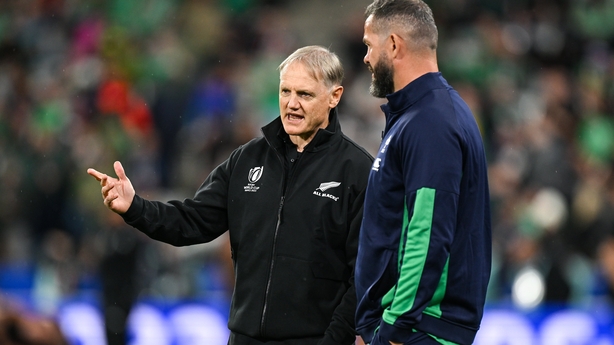
"I suppose an inferiority complex is what's happened in the past in terms of getting to world number one and thinking that we're going to fall off a cliff because this shouldn't be happening to Ireland," said the Wigan native before the game.
"But, what we've tried to do is throw ourselves into challenges and meet them head on and embrace that. We don't want to be second best, we want to be first best."
Details of the review of that game which Ireland lost 28-24 after giving the All Blacks a 13-0 lead by the 21st minute, have been sparse.
Yes, there were plays that could have gone either way, and New Zealand picked the perfect time to produce their best performance in two years, but, Bundee Aki and Hugo Keenan aside, the 13 other starters will all feel they could have played better.
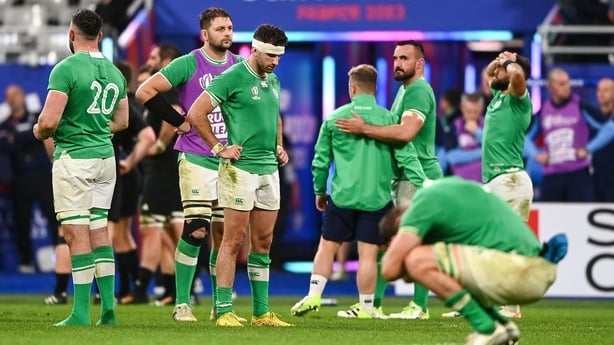
There’s no way to say for sure if Ireland’s history at the World Cup, or their favouritism going into the tie played any part but that’s a huge swathe of a team to underperform in unison.
Ireland excelled against France a month ago when they were four-point underdogs.
They were stop-start against both Italy and Wales but next up is another chance for this team to prove what they are about on the road in a much more hostile environment, with real jeopardy involved.
The visitors, seven days out, go to Twickenham as barely believably 11-point favourites.
An assured and free-flowing performance in such circumstances would be another statement from Farrell and his men, and go a long way to answer questions surrounding their ability to fully embrace life as top dogs.
Listen to the RTÉ Rugby podcast on Apple Podcasts, Spotify or wherever you get your podcasts.
Watch Cardiff v Leinster in the URC on Saturday from 7pm on RTÉ2 and RTÉ Player, follow a live blog on rte.ie/sport and the RTÉ News app.


